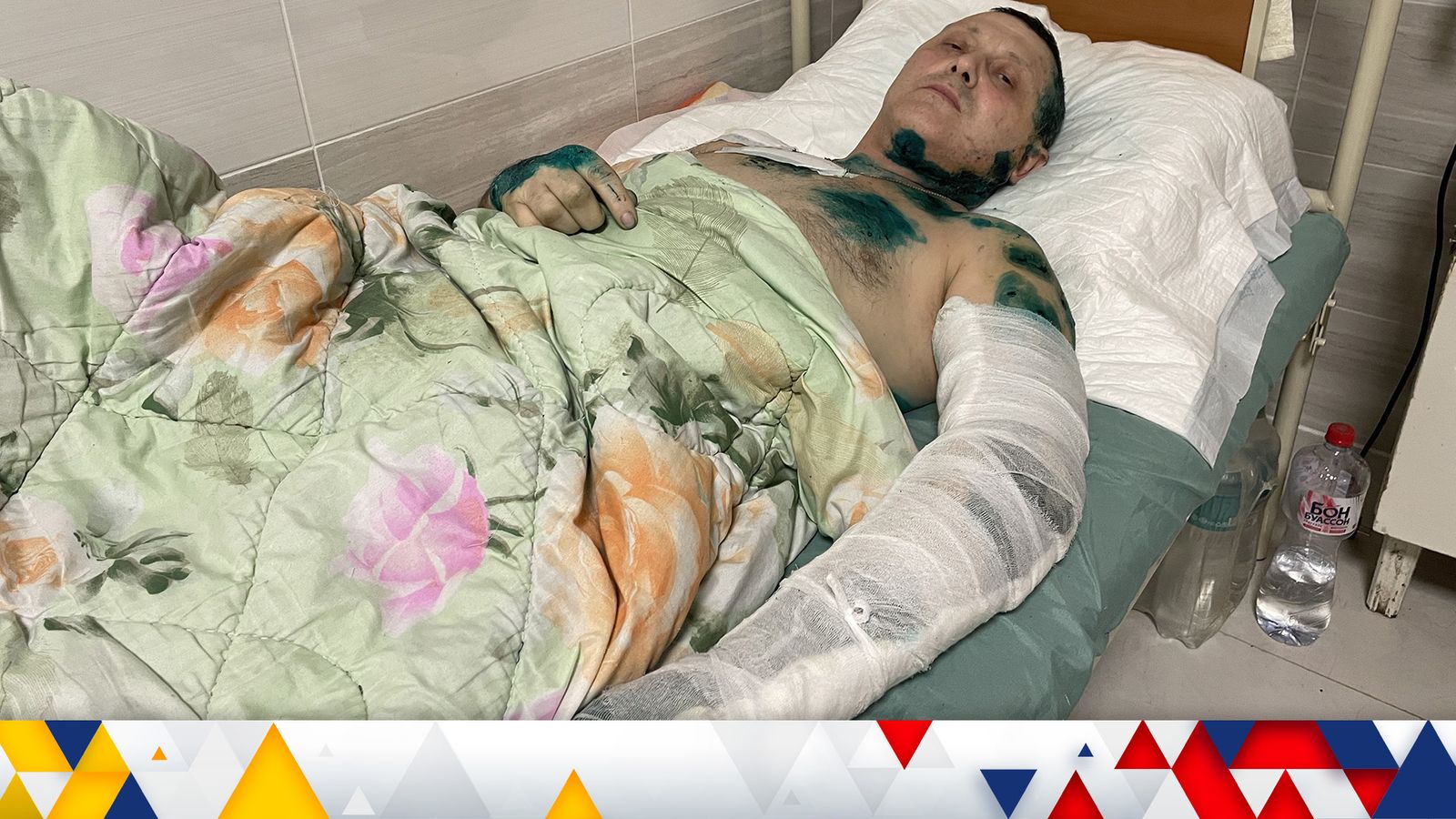They all know the way to the recovery rooms at the hospital in the city of Kramatorsk.
“Head past the sandbags on the ground floor,” said an elderly, “down the hallway to the stairs.”
On the second floor there are a couple of doors, and we stopped at number two.
NATO predicts major new Russian offensive – live updates
The hospital’s medical director, Valentyna Chubatenko, told us we would find similar scenes in any ward in eastern Ukraine – the same sort of injuries, the same sort of suffering, both mental and physical.
“Our doctors have a lot of work, it is the same for everybody, it’s very hard”, said Dr Chubatenko.
‘It was unimaginable’
Ukraine war: Zelenskyy says Russia wants to turn his people into ‘silent slaves’ in address to UN Security Council
Ukraine war: The West is chipping away at Russia’s ability to finance its violent campaign
Ukraine war: EU proposes ban on coal imports from Russia worth $4.4bn a year amid outrage over Bucha killings
We found a man called Alexandr Dyachanko, sitting upright in the corner of the room.
His body was covered in a distinctive, blue-green antiseptic dye, which had been applied to his wounds caused by a major blast.
He told us he had just finished breakfast on the morning of 18 March when he almost lost his life.
“I was drinking coffee, I went to the bedroom, and it happened in a moment, it was unimaginable, just ‘bang’, and then nothing,” he said.
In an attack that was both indiscriminate and deliberate, Mr Dyachanko’s apartment building in the centre of Kramatorsk was hit by a number of rockets.
Large blast waves generated by the explosions shattered the glass, window frames and doors.
The contents of the flat were expelled into the surrounding area.
‘How can you give an order to destroy a residential district?’
“I have these pieces in my shoulder, glass, and all the garbage that was flying,” said Mr Dyachanko.
“Everything was flying because of the blast wave and here, torn off in the explosion. They sewed me up.”
Local residents said six people from the building were killed in the explosions, with another 28 injured.
“How can you give an order to destroy a residential district?” Mr Dyachenko demanded. “It’s happening everywhere in Ukraine.”
Follow the Daily podcast on Apple Podcasts, Google Podcasts, Spotify, Spreaker
Mr Dyachenko, who runs a small business, has been joined in room two by his neighbour, Vitali Vyhotsev, who lived in the same building.
Vitali remembers two blasts on the morning of 18 March. The second explosion has left him blind.
“I was at my apartment, on the first floor,” he recalled. “The first explosion was a big one, and I went to the window and saw the glass falling from the higher floors. At this moment, the second explosion happened.
“I was blown by the blast to the end of the room or maybe the corridor. Somehow, I stood up and moved in the direction of the entrance from my memory. Somehow, the volunteers got me out”.
His mother looked on in tears. Doctors have told Mr Vyhotsev, a steelworker, that we may regain some vision in his left eye – but he knows his life will never be the same.
“This is a worrying time for you?” I asked.
“Yes, yes it is, to lose your sight,” he replied.
‘My children grabbed a rocket – and it exploded in the house’
On the other side of the room two, we met a man called Viacheslav Yepiefantsev, who had been admitted with extensive shrapnel wounds.
He told us that a rocket had landed in his house. However, the weapon did not detonate until his children touched it.
“So it came in through our window and children being children, they just grabbed it,” he recalled. “It was not a big one with a tail. The children grabbed it, and it exploded in the house.
“My daughter had a lot of shrapnel in her legs and the pieces went through all her body.
“My son was sent to Dnipro to the hospital.”
Subscribe to Ukraine War Diaries on Apple Podcasts, Google Podcasts, Spotify, Spreaker
His daughter, Daryna, who was one year and seven months, was seriously injured in the explosion.
The surgical team at Kramatorsk’s hospital spent five hours trying to stem the bleeding.
Tragically, they were unable to save her life.
‘All wars are absurd – it’s impossible to understand’
Dr Maksym Ubozhenok heads the hospital’s surgery department.
“You can’t get used to such a thing,” he said.
“I have treated children for 30 years, in surgery, but these injuries are completely different.”
He’d brought Daryna’s X-rays and placed them on the window, highlighting specks of metal throughout her body.
“This is the abdominal area, here are some fragments. It is only metal fragments, but the wood and concrete (fragments), you can’t see them here,” he pointed out.
I asked Dr Ubozhenok if there is a way to come to terms with it all – the savagery of these acts and their bewildering randomness.
“It’s completely absurd,” he said. “It’s surreal, this war, all wars are absurd. It’s impossible to understand.”






















